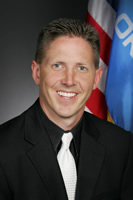In order to provide equal access and equal opportunity to people with diverse abilities, this site has been designed with accessibility in mind. Click here to view
Bill to address Medicaid fraud in Oklahoma heads to Governor’s desk
 Sen. Josh Brecheen
Sen. Josh Brecheen
A measure to help decrease Medicaid fraud in Oklahoma was approved overwhelmingly 86-1 in the House Tuesday. Senate Bill 27, by Sen. Josh Brecheen, will direct the Oklahoma Health Care Authority to require the state’s 40,000 Medicaid providers to post signage explaining how to anonymously report fraudulent Medicaid activity in all locations where services are provided.
“With so many Medicaid providers in the state, it’s important that customers and employees know how to report fraud as they are the ones most likely to be aware of any questionable participation by providers,” said Brecheen, R-Coalgate. “Based on conversations with state officials tasked with oversight, we can safely say that 95 percent of these providers participate with integrity but the other five percent, at times, operate in a questionable manner. That gray area costs Oklahoma taxpayers millions of dollars each year and takes money away from those who truly need it. We must do all we can to stop Medicaid fraud in Oklahoma.”
Medicaid providers are the companies that provide services to Medicaid recipients such as hospitals, physical therapists, mental health counseling providers, medical device businesses, nursing homes, etc.
Rep. Arthur Hulbert served as the principal House author on the measure.
“This legislation received overwhelming passage in the House because lawmakers on both sides of the aisle understand that that fraud is immoral, wastes tax dollars and diverts funds away from those that truly need it,” said Hulbert, R-Fort Gibson. “I was honored to author the legislation in the House. It is very important that we let Oklahomans know that they are our best resource to fight fraud.”
Brecheen noted that he filed SB 27 along with SB 456, which received final approval in the House last week and was sent on to the Governor, to address the growing problem of Medicaid fraud in Oklahoma. Both bills were developed in consultation with the DHS Office of Inspector General and the Oklahoma Health Care Authority.
“Such signage has been printed and used sporadically in the past but displaying it has never been a statutory requirement to maintain a state Medicaid contract or in DHS offices,” said Brecheen. “The main deterrent to reporting Medicaid fraud for people is fear that they’ll get fired because they work for a provider or damage a relationship because a loved one is committing fraud. Unfortunately, most people don’t know that their anonymity is federally-protected under the Medicaid False-Claims Act. These signs will help educate the public about this important protection and hopefully encourage more people to report public assistance fraud.”
SB 27 will now be considered by the Governor.
 Oklahoma Senate
Oklahoma Senate

